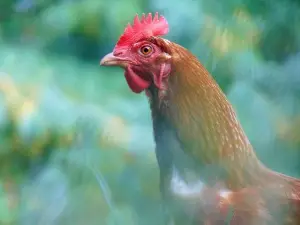
Raising chickens is a full-time job, if a chicken gets sick, the bird can go downhill very quickly, thus it is very important that you maintain your bird’s health as best you can.
If your bird has an irregular pupil or irregular pupils then you’d be right to be worried, this article looks at why this happens
Table of Contents
Chicken irregular pupil:
An animal and a person’s eyes make survival easier, an irregular pupil can be very bad for chickens, this is why chickens may develop an irregular pupil:
Marek’s disease:
Marek’s disease is a highly infectious disease caused by the herpes virus. A sick bird will transmit this disease to other birds through its feather dander.
This ailment can cause a number of symptoms in your bird, the bird developing an irregularly shaped pupil is one of them.
A bird suffering from ocular marek’s will develop gray eyes, cloudy eyes, irregularly shaped pupils, difficulty seeing, and, the bird may eventually become totally blind.
Marek’s can cause a variety of other symptoms in birds, the symptoms differ depending on the type of marek’s that the bird has.
Thankfully, if the bird has ocular marek’s then the bird may survive. The other types of marek’s can be fatal to the bird.
Other symptoms of marek’s
Symptoms of marek’s in addition to the bird having an irregular pupil include:
- Tumors
- Blindness
- Paralysis of the leg
- Difficulty navigating
- Weight loss
- Severe sores on the body
Treatment:
Unfortunately, marek’s disease is untreatable.
Birds with ocular marek’s have a chance at life but the other types of marek’s are usually fatal to birds, the birds almost never recover from them. Chickens suffering from this disease will starve, become emaciated, and will die
The best thing that you as a bird owner can do is to humanely euthanize your bird once you’re sure that it has marek’s.
A bird may develop immunity to this disease but it can still spread it through its feather dander. The best thing you can do to minimize the chances of your birds contracting this disease is to buy vaccinated chicks.
The vaccine should be given when chicks hatch or when the chicks are in the egg, before hatching.
Cataracts:
Cataracts is another ailment that can negatively affect your chicken’s eyes. A chicken’s normal healthy pupil should be round, black, and clear, as clear as a camera lens. This allows light to easily pass into the chicken’s eye.
A cataract is a white film that covers the eye preventing light from entering the eye. If a bird has cataracts you will see a visible whiteness in the bird’s pupil.
Cataracts develop on a bird’s eye because of different reasons, these include disease (marek’s and others), genetics, environment, or diet.
Other signs of this ailment:
In addition to a white film developing on your bird’s pupil, cataracts can also cause other symptoms in the bird including:
- Loss of eyesight
- Cloudy eyes
- Weight loss
- Sensitivity to light
Treatment:
Unfortunately, there is no treatment for cataracts in chickens, the bird can have cataract-removal surgery but this is risky to your bird.
A bird that has cataracts will eventually develop blindness. If your bird does eventually go blind, you’d need to offer supportive care to the bird.
Offering supportive care to your bird looks like keeping your bird’s food and water stations in the same place. This will enable the blind bird to find food and water easily and keep them from becoming frustrated.
Supportive care also looks like keeping an eye on the blind bird and making sure that the rest of the flock doesn’t bully it.
Manson’s eye worm:
Chickens become infected with this roundworm if they ingest the Surinam cockroach. The Surinam cockroach is the immediate host of the roundworm which causes the disease known as Manson’s eye worm.
Once the cockroach is in the bird’s body, larvae will be released in the bird’s body and travel through the bird finally reaching the bird’s eye.
If your bird has this disease then your bird will try to get the worms out by scratching its eyes. This scratching and eventually tearing of the eye will make the bird’s eye look irregular and this can cause the bird’s eye to look whitish opaque
Other symptoms of this ailment:
- Face scratching
- Inflamed swollen eyes
- Intense tearing of the eye
- Red eyes
- Fluid coming from the eyes
Treatment:
Treatment of this condition involves flushing the bird’s eyes using pure water at first then using Lysol, vetRx, and cresol to kill off the worms in your bird’s eye. This process will likely have to be done a number of times to get rid of the worms.
Cleaning your birdhouses and using a cresol-based disinfectant is also recommended, this will clear out any worms and eggs in your bird’s pen.
Getting rid of your manure is also a good idea as roaches love it.
If you enjoyed this article then you may also be interested in other chicken related articles. Here are some articles that you may be interested in: Chicken Pecked To Death, Chickens Eyes Stuck Closed, Chicken Blind In One Eye, Lethargic Rooster With Closed Eyes

